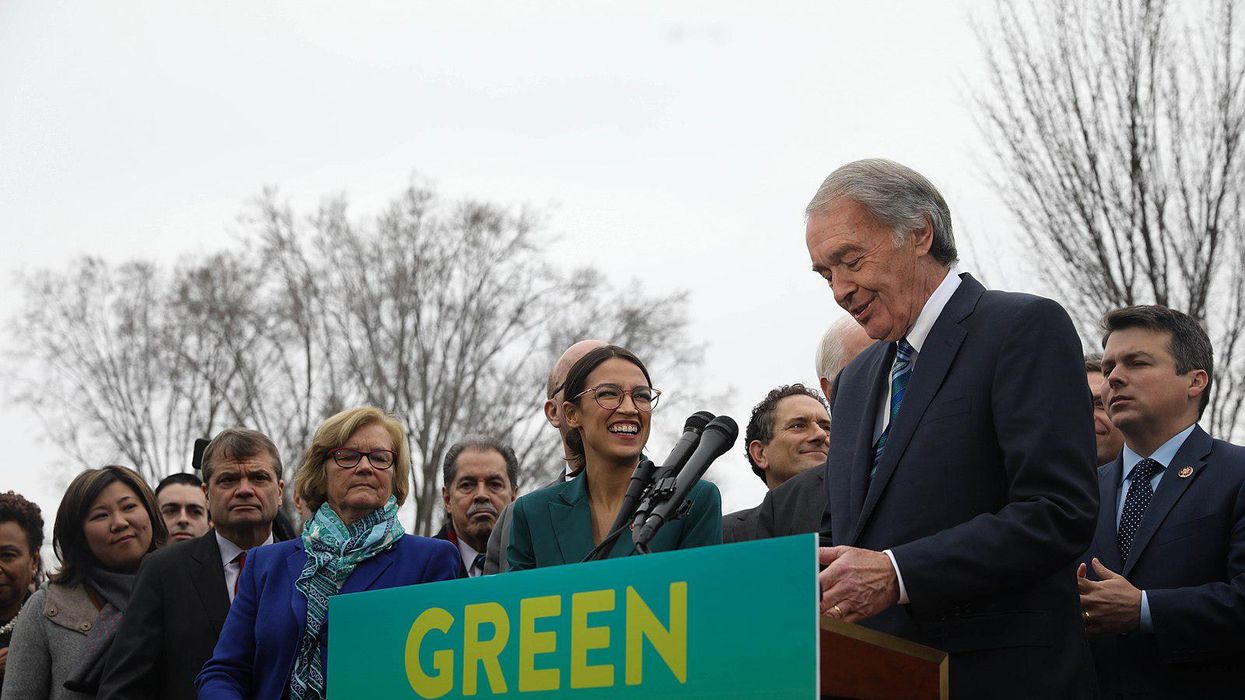Progressive Democrats Set Conditions For Infrastructure ‘Compromise’

Sen. Ed Markey, right, with fellow progressive Democrats, including Rep. Alexandria Ocasio-Cortez, to his right.
Reprinted with permission from American Independent
Democratic leaders are reportedly mulling accepting a bipartisan compromise infrastructure plan as long as the Democratic senators working with Republicans on the plan agree to another massive investment package later that would include the care giving and climate infrastructure investments.
According to Politico, they are open to passing a compromise bill with $579 billion in new investment in transportation, broadband, and water system infrastructure being shopped by a group of five Democrats and five Republicans. But they would only do so if they got assurances from those Democrats that they will later support passing more spending through the budget reconciliation process, which would not require any GOP support.
On CNN on Sunday, House Speaker Nancy Pelosi expressed a similar sentiment: "We must build back better. So if this is something that can be agreed upon, I don't know how we can possibly sell it to our caucus unless we know there is more to come."
Senate Majority Leader Chuck Schumer said last week, "We all know as a caucus, we will not be able to do all the things that the country needs in a totally bipartisan way. But we're not going to sacrifice the bigness and boldness in this bill. We will just pursue two paths and at some point they will join."
President Joe Biden initially proposed a $2.25 trillion American Jobs Plan that would invest in transportation, water systems, broadband, climate change, clean energy, child care, and caregiving infrastructure. He also asked Congress to pass a $1.8 trillion American Families Plan, which would provide free community college and expand access to affordable child and health care.
Republicans have objected to both plans, calling them "socialism," not really infrastructure, and too expensive. They also unanimously opposed his proposals to pay for the investment by keeping his campaign promises to raise taxes on corporations and those making $400,000 and up.
Sen. Susan Collins (R-ME), one of the 10 senators pushing the compromise package, said Sunday that the bipartisan infrastructure plan would contain no tax increases and would be funded mostly by repurposing unspent pandemic relief funds and charging new fees to drivers of electric cars.
Two of the most conservative members of the Senate Democratic caucus are also part of the bipartisan group: Sens. Joe Manchin of West Virginia and Kyrsten Sinema of Arizona. Both have refused the go-it-alone Democratic strategy in the narrowly divided chamber, pushing to work with Republicans.
Several other Democrats have spoken out against accepting a plan like theirs that does not include investment to address climate change.
"No climate, no deal," warned Massachusetts Sen. Ed Markey on June 9.
With "nothing on climate change," said Senate Finance Committee Chair Ron Wyden the next day, the package would be "a complete nonstarter."
But if the conservative Democrats promised to support a subsequent bill that included vital investments that were excluded from the infrastructure package, those concerns could be assuaged.
"There would have to be clarity that we're getting the second package. Manchin and Sinema are going to have to give assurances to [Senate Budget Committee Chair] Bernie [Sanders]," an unnamed Democratic source told Politico.
For that to happen, however, at least 10 Republicans would have to agree to the infrastructure proposal. So far, only Sens. Bill Cassidy (LA), Collins, Lisa Murkowski (AK), Rob Portman (OH), and Mitt Romney (UT) have endorsed it.
If that does not come about, the Democrats could pass the entire plan without a single GOP vote using the Senate's budget reconciliation rules if all of them were to vote in favor.
Published with permission of The American Independent Foundation.
- Romney's 'Deal' Would Tax Working Families, Not Corporations ... ›
- VIDEO: Sanders Tells Biden, Don't 'Slow Down” On Infrastructure ... ›
- New Poll: Americans Say Tax Wealthy And Corporations To Fund ... ›
- Biden Kicks Off Effort To Reshape Economy With Infrastructure Plan ... ›
- New Poll: Biden's Infrastructure Ideas Are Popular, But Partisan ... ›
- Why Henry Ford Would Support Biden's Infrastructure Plan ... ›
- Polls Show Massive Support For Biden's Trillion-Dollar Infrastructure ... ›
- Infrastructure Deal Hinges On Additional Climate And Social Spending - National Memo ›
- Senate Republicans Whining Over Biden’s ‘Two-Track’ Infrastructure Plan - National Memo ›
- GOP Senators Torpedo Bipartisan Infrastructure Deal They Endorsed - National Memo ›
- Republicans Block Infrastructure Bill That Promises 500K New Manufacturing Jobs - National Memo ›
- Pelosi Delays Infrastructure Vote As Congress Begins Critical Week - National Memo ›
- Biden And Progressives Ready To Pare Spending For 'Build Back Better' Deal - National Memo ›
- President Biden Ends Infrastructure Talks With Senate GOP Group ... ›
- Here's The Latest On The White House's Infrastructure Talks : NPR ›
- Liberals start to draw the line on infrastructure negotiations - The ... ›
- Biden Cuts Off Stalled Infrastructure Talks With Leading ... ›
- Biden's infrastructure talks with GOP collapse amid irreconcilable ... ›
- Infrastructure negotiations: 4 things to watch on Capitol Hill ... ›
- CBS/ Biden ends infrastructure negotiations with Republican senators ›
- Biden-Capito infrastructure negotiations have ended - ABC News ›








